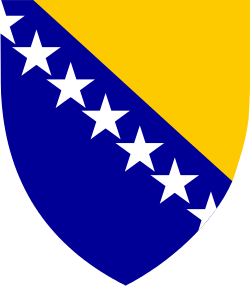Unrest in SR Bosnia and Herzegovina
| Unrest in SR Bosnia and Herzegovina | |
|---|---|
| Location |
|
| Date | 1 March[1] — 5 April 1992 |
| Deaths | 260 |
Non-fatal injuries | nearly 1000 |
| Perpetrators | Anti-war demonstrators,[2]Ethnic Clashes |
Number of participants | Protesters: around 100,000 |
On 1 March 1992, Serbs consider Nikola Gardović, a groom's father killed at a wedding procession on the second day of the Bosnian independence referendum, in Baščaršija.[3] The Sijekovac killings of Serbs took place on 26 March and the Bijeljina massacre (of mostly Bosniaks) on 1–2 April. Some Bosniaks consider the first casualties of the war to be Suada Dilberović and Olga Sučić, both shot during a peace march on 5 April at a hotel under the control of the Serbian Democratic Party.[4][5][6]
References
- ↑ Donia, Robert J. "Sarajevo: A biography". ISBN 978-0-472-11557-0. Retrieved 25 April 2015.
- ↑ http://balkans.aljazeera.net/vijesti/hronologija-opsade-sarajeva
- ↑ Donia, Robert J. "Sarajevo: A biography". ISBN 978-0-472-11557-0. Retrieved 25 April 2015.
- ↑ Donia, Robert J. (February 2006). "Sarajevo: A biography". ISBN 978-0-472-11557-0.
- ↑ Schmidt, Bettina; Schröder, Ingo; Anthropologists, European Association of Social (2001). "Anthropology of violence and conflict". ISBN 978-0-415-22905-0.
- ↑ Totten, Samuel; Bartrop, Paul Robert; Jacobs, Steven L. (2008). "Dictionary of Genocide: A-L". ISBN 978-0-313-34642-2.
Coordinates: 47°01′40″N 28°49′40″E / 47.02778°N 28.82778°E / 47.02778; 28.82778
| Eastern Europe | |
|---|---|
| Western Europe | |
| Yugoslav Wars | |
| Southeast Europe (after Yugoslav Wars) | |
| North Caucasus | |
| South Caucasus | |
| Related topics | |
| |
Bosnia and Herzegovina topics | ||
|---|---|---|
| History | ||
| Geography | ||
| Governance | ||
| Economy | ||
| Society | ||
| Culture | ||
Yugoslavia articles | |||||||||||||||||||||||||||
|---|---|---|---|---|---|---|---|---|---|---|---|---|---|---|---|---|---|---|---|---|---|---|---|---|---|---|---|
| History |
| ||||||||||||||||||||||||||
| Politics |
| ||||||||||||||||||||||||||
| Economy |
| ||||||||||||||||||||||||||
| Society |
| ||||||||||||||||||||||||||
| |||||||||||||||||||||||||||
This article is issued from Wikipedia - version of the 12/4/2016. The text is available under the Creative Commons Attribution/Share Alike but additional terms may apply for the media files.
